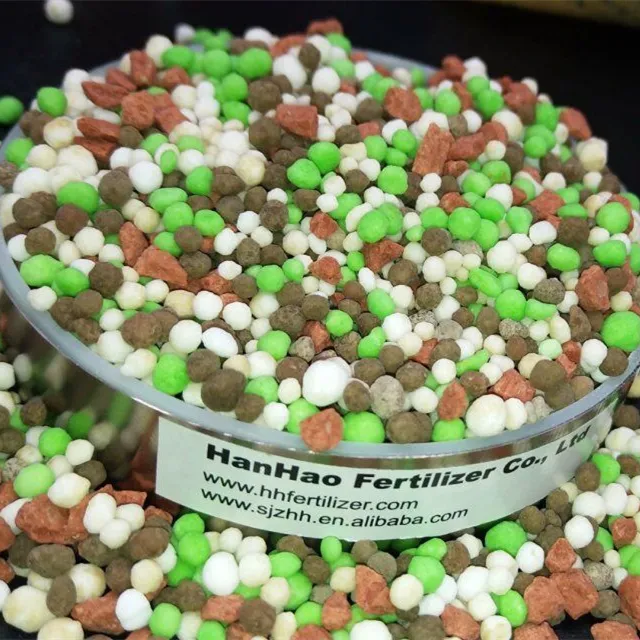
Mai . 23, 2025 09:24 Zurück zur Liste
NPK Fertilizer: Balanced Nutrition for Stronger Crops and Bigger Yields
Among all crop inputs, fertilizer plays a defining role in plant health and yield. And when it comes to complete, balanced nutrition, NPK fertilizer is one of the most widely used and trusted solutions. It combines three essential nutrients — nitrogen (N), phosphorus (P), and potassium (K) — to support every stage of plant growth.

Whether you're comparing types of NPK fertilizer, sourcing NPK fertilizer for sale, or managing application for a large-scale farm, this guide gives you the breakdown you need to make smarter decisions in the field.
What Is NPK Fertilizer?
NPK fertilizer is a multi-nutrient fertilizer containing the three macronutrients plants need in large amounts:
N (Nitrogen) – Promotes leafy growth and green biomass
P (Phosphorus) – Supports root development and flower/fruit production
K (Potassium) – Improves stress tolerance, water regulation, and overall plant strength
NPK fertilizers come in various formulations, both in granular and liquid form, and are widely used in everything from commercial farming to home gardening.
Common Types of NPK Fertilizer
Different crops, soils, and growth stages require different nutrient ratios. That’s why there are many types of NPK fertilizer — each formulated to meet specific agronomic needs.
1. Balanced NPK (e.g., 10-10-10 or 20-20-20)
Equal parts nitrogen, phosphorus, and potassium
Suitable for general-purpose fertilization
Common in vegetables, flowers, and lawns
✅ Best for: Broad-spectrum use when no single nutrient dominates the need
2. High-Nitrogen NPK (e.g., 30-10-10 or 25-5-5)
Boosts leafy green growth
Often used in early growth stages or for turfgrass
✅ Best for: Corn, spinach, lettuce, and cereal crops during vegetative growth
3. High-Phosphorus NPK (e.g., 10-52-10 or 12-60-0)
Encourages strong root development and flowering
Helps plants during transplanting or fruit setting
✅ Best for: Fruit trees, flowering plants, and root vegetables
4. High-Potassium NPK (e.g., 15-5-30 or 12-6-24)
Enhances fruit quality, disease resistance, and drought tolerance
✅ Best for: Tomatoes, potatoes, grapes, and crops nearing maturity
5. Custom NPK Blends
Tailored to local soil tests or crop-specific needs
Often blended by fertilizer companies or co-ops
✅ Best for: Precision farming or specialty crops with unique nutrient demands
Granular vs. Liquid NPK Fertilizer
|
Form |
Vorteile |
|
Granular |
Slow-release, easy to apply, cost-effective |
|
Liquid |
Fast-acting, great for fertigation or foliar application |
Many farmers use both — granular for base application and liquid for top-up or in-season feeding.
Where to Buy NPK Fertilizer for Sale
If you're looking for NPK fertilizer for sale, there are several sourcing options:
Packaging options:
1kg, 5kg, 25kg, and 50kg bags
500kg or 1000kg jumbo bags for bulk delivery
Liquid NPK in 20-liter drums or 200-liter barrels
For large orders, always request:
Certificate of Analysis (COA)
MSDS (Material Safety Data Sheet)
Batch test results for nutrient accuracy
Application Tips for NPK Fertilizer
Base dressing – Apply granular NPK at planting to support root and early growth
Top dressing – Add mid-season to sustain energy through flowering or fruiting
Fertigation – Inject liquid NPK through drip or pivot irrigation systems
Foliar feeding – Spray diluted liquid NPK for quick correction of deficiencies
Pro Tip: Always base NPK application on a soil test. Over-fertilizing can lead to nutrient runoff, plant stress, and wasted investment.
NPK Fertilizer Price Guide
The price of NPK fertilizer varies depending on the formulation, raw material cost, and shipping terms.
Estimated bulk price range (USD/metric ton):
|
Type |
Typical Price Range (USD/MT) |
|
15-15-15 (Granular) |
$350 – $550 |
|
20-20-20 (Water soluble) |
$900 – $1,200 |
|
10-52-10 (High-P) |
$750 – $950 |
|
12-6-24 (High-K) |
$500 – $700 |
|
Custom blends |
Varies by input cost and ratios |
Pricing can also be influenced by seasonality, global supply chains, and fertilizer subsidy programs (in some countries).
NPK Fertilizer FAQs
Q1: How do I choose the right NPK ratio for my crop?
A: Use a soil test to identify nutrient gaps, then match the NPK ratio to the crop’s stage and needs.
Q2: Is organic NPK fertilizer available?
A: Yes. Some organic fertilizers are blended to approximate NPK ratios using compost, bone meal, and other natural sources.
Q3: How often should I apply NPK fertilizer?
A: Typically 2–3 times per crop cycle — at planting, mid-growth, and pre-harvest (if needed). Liquid NPK can be applied more frequently in smaller doses.
Q4: Can I mix NPK fertilizer with other nutrients?
A: Yes, but check compatibility, especially for liquid mixes. Some micronutrients may react negatively if not stabilized.
Q5: Does NPK fertilizer expire?
A: Not really. If stored in a dry place, granular NPK remains effective for years. Liquid products should be used within 1–2 years for best results.
From large-scale grain production to backyard gardens, NPK fertilizer is a cornerstone of modern plant nutrition. Understanding the types of NPK fertilizer, their uses, and how to apply them helps you get the most out of your land and investment.
-
Organic Pepper Fertilizer – Sustainable Growth for Healthier Crops and Soils
NachrichtNov.25,2025
-
Sustainable Growth with Organic Phosphate Fertilizer | Benefits & Innovations
NachrichtNov.24,2025
-
Organic Phosphorus and Potassium Fertilizer: Sustainable Soil Nutrition & Global Impact
NachrichtNov.24,2025
-
Organic Phosphorus Fertilizer: Sustainable Nutrient Solutions for Modern Agriculture
NachrichtNov.23,2025
-
Sustainable Growth with Organic Phosphorus Plant Fertilizer | HH Fertilizer
NachrichtNov.23,2025
-
Organic Plant Meal Fertilizer for Sustainable Agriculture – Benefits & Innovations
NachrichtNov.22,2025
